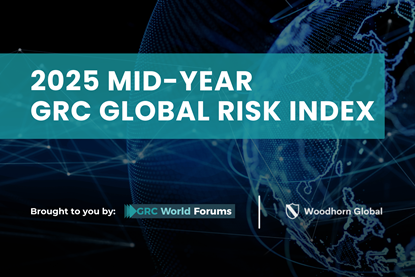Governance, Risk & Compliance (GRC)
Explore the latest thinking in Governance, Risk, and Compliance (GRC). Join us at the GRC Stage at #RISK Expo Europe to discover practical strategies for joined-up risk management, achieving seamless regulatory compliance, and building robust organisational assurance across your entire enterprise.
#RISK Intelligence - Latest from the GRC Stage at #RISK Expo Europe
- Fact Sheet
#RISK Expo Europe Unites GRC, Cyber, and Regulatory Leaders at Scale
As geopolitical instability and agentic AI redefine the global threat landscape, #RISK Expo Europe returns to ExCeL London on 10–11 November 2026 as the definitive hub for integrated and cross-functional risk.
- Opinion
Accountability as a competitive AI differentiator
As the global AI race accelerates, trust — not compute — is emerging as the true source of competitive advantage.
- Opinion
Governing ESG Risk and Opportunity in a High-Impact, Low-Certainty Environment
As ESG shifts from standardised reporting to board-level judgement under uncertainty, the real differentiator is no longer disclosure but governance quality and decision discipline.
- Opinion
Resilience in the Age of AI: How EW-AiRM© future-proves Enterprise Risk Management
As AI introduces speed, scale and uncertainty that traditional ERM was never built to handle, risk leaders are being forced to rethink resilience from the ground up.
Closing the Gap: How Nooga is Redefining “DevGRCOps”
From kitchen table debates to a global startup, Emelie and Magnus Nooga are on a mission to weave risk and compliance directly into the developer’s workflow.
- Previous
- Next
ERM Is Dead (As We Know It): Why Strategic Resilience Must Lead in 2026
Traditional ERM frameworks are struggling to keep pace with systemic disruption, leaving boards with reports rather than decision-ready insight.
Closing the Gap: How Nooga is Redefining “DevGRCOps”
From kitchen table debates to a global startup, Emelie and Magnus Nooga are on a mission to weave risk and compliance directly into the developer’s workflow.
#RISK Expo Europe 2026 is an open, inclusive, community first expo
Breaking down barriers to entry for the global GRC community, #RISK Expo Europe 2026 returns to Excel London on 10 & 11 November. This open, free-to-attend event provides a unique space where practitioners, regulators, and innovators engage on equal terms. Featuring 300+ expert speakers across multiple themed stages and AI-focused workshops, #RISK Expo Europe is the essential gathering point for CEOs, CROs, and CISOs seeking a collaborative, inclusive approach to organisational resilience and integrated risk strategy.
ESG is Now a Top-Tier Risk: How Boards, CFOs & CROs Must Integrate Sustainability into GRC Strategy for 2026
ESG (Environmental, Social, and Governance) is no longer a peripheral concern; it is a board-level risk and value driver. With mandates like CSRD and expanding director liability demanding action, organisations must integrate ESG into core GRC strategy. Explore how CROs, CFOs, and General Counsel can operationalise ESG governance, embed climate risk into prudential frameworks, and leverage technology at the dedicated ESG sessions across the GRC and BFSI Stages at #RISK Expo Europe 2026.
#RISK Expo Europe 2026 established and still scaling
By year five, repeat attendance, word‑of‑mouth and brand familiarity typically start to play a larger role than launch marketing but we’re not relaxing.
Beyond GRC: #RISK Expo Europe 2026 Adds Five Critical New Categories to Meet Evolving Risk Demands
In direct response to feedback from senior decision-makers, the 2026 programme will now feature dedicated streams for Identity & Access Management, Operational Resilience & Business Continuity, Procurement Risk & Supplier Governance, Physical Security & Asset Protection, and Crisis Management & Incident Response, expanding coverage beyond traditional GRC.
Why #RISK Expo Europe 2026 is the Ultimate High-ROI Hub for GRC & Security Vendors
Positioned as a high-return environment for lead generation and brand positioning, #RISK Expo Europe 2026 (Nov 10-11, Excel London) unites a cohort of senior decision-makers with direct purchasing authority. The event offers dedicated stages spanning the entire ecosystem, from Information Security and BFSI to GRC, Protective Security, and Supply Chain resilience.
#RISK Expo Europe 2026: Why This Is the £7.5 Billion Meeting Place for GRC & Risk Solution Buyers, Not Just Leads
Forget top-of-funnel lead generation. #RISK Expo Europe 2026 provides unparalleled, direct access to a concentrated buying committee of senior decision-makers and key purchasing influencers in GRC, privacy, and security, controlling an annual collective budget of £7.5 billion. This is where high-intent prospects meet high-value solutions.
The UK’s AI Superpower Playbook: An Investment in Risk and Opportunity
The UK has officially declared its intention to become an “AI superpower,” a bold ambition underpinned by a historic influx of capital from major U.S. technology firms.
Navigating the New Geopolitical Landscape: Insights from #RISK Europe
The global landscape has entered an era of unprecedented volatility.
Forging the Future of GRC and AI: #RISK AI London Partners with AGRC for Unparalleled Insight
In an era where Artificial Intelligence is rapidly reshaping every facet of business, the need for robust governance, sophisticated risk management, and stringent compliance has never been more critical.
Navigating the Future of Regulation: Insights from Rory McGrath of Corytics
In a recent interview, Rory McGrath, who heads the global pre-sales team at Corytics, shared his expert perspective on the evolving landscape of regulatory change and compliance within financial institutions.
Forging the Future of GRC: #RISK New York and GRC Report Unite
#RISK New York is thrilled to be partnership with GRC Report, a leading voice in the governance, risk, and compliance landscape. This collaboration reinforces a long-standing commitment to providing unparalleled insights and fostering crucial discussions within the GRC community.
Jeremy Asher
Director, Financial Fraud Awareness Campaign (FFAC)
Insights from “Tipper X”: Behavioral Science Meets GRC at #RISK New York
The Compliance Podcast Network, represented by Tom Fox, recently featured an insightful interview with Tom Hardin, known as “Tipper X,” providing a preview of his upcoming presentation at the #RISK New York City conference.
Tom Fox to Discuss Future of Compliance at #RISK New York
Compliance expert Tom Fox will present insights from his new book at the upcoming #RISK New York conference, focusing on the evolution of risk management.
Matt Collinge
Senior Global Data Privacy Advisor, bp
Daniel Lousqui
Associate General Counsel, Vanguard
Susanne Bitter
Head of Regional Strategic Alliances, Cyber Security Forum Initiative
Marta Dunphy-Moriel
Founder, Dunphy-Moriel Legal Services LTD
Elena Maran
Global Head of Financial Services and Responsible AI at Modulos AG
Sibylle Barden
Author | Podcast Host | Board Advisor, Shaping the Global Narrative | Stakeholder Capitalism | Strategic Communication
Navigating 2025’s Volatility: The GRC Global Risk Index
With half of 2025 behind us, the imperative to diagnose and predict geopolitical risk is higher than ever. This exclusive index illuminates key global threats—and shares tangible steps to safeguard your firm’s operations and long-term value.
Exploring AI Risks in Compliance with Gwen Hassan
In this episode of the #RISK NYC podcast series, Tom Fox speaks with Gwen Hassan about the critical topic of AI risks.
Stanislav Kovalenko
Head of Privacy, Nova Global
Robert McBlain
Global Data Protection and AI Compliance Lead, Thoughtworks
Richard Harrington
Fraud Manager, Charities Aid Foundation
Dr Anandhi Vivek Dhukaram
Chief Responsible AI & Data Officer & EU AI Act Adoption & Compliance Strategist, Esdha - Responsible AI Literacy Training for EU AI Act
Kyle Martin
Vice President of Product Management at NAVEX
Toni McLelland
Managing Director, 1st Life Group




























































